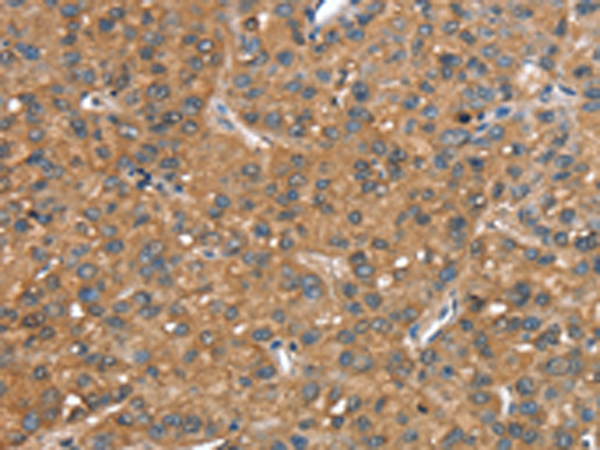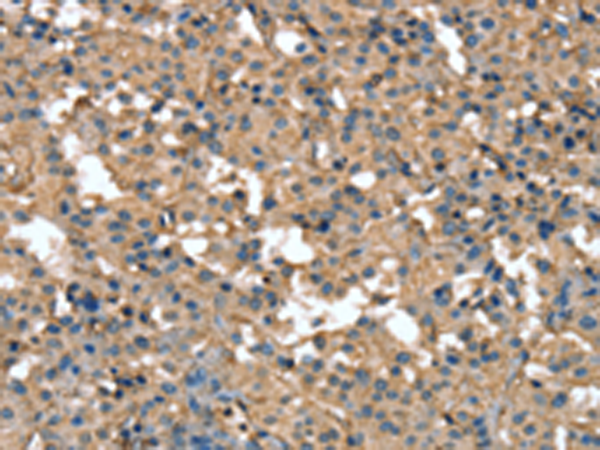

| WB | 咨询技术 | Human,Mouse,Rat |
| IF | 咨询技术 | Human,Mouse,Rat |
| IHC | 1/25-1/100 | Human,Mouse,Rat |
| ICC | 技术咨询 | Human,Mouse,Rat |
| FCM | 咨询技术 | Human,Mouse,Rat |
| Elisa | 1/1000-1/2000 | Human,Mouse,Rat |
| Aliases | KN; C3BR; C4BR; CD35 |
| Host/Isotype | Rabbit IgG |
| Antibody Type | Primary antibody |
| Storage | Store at 4°C short term. Aliquot and store at -20°C long term. Avoid freeze/thaw cycles. |
| Species Reactivity | Human |
| Immunogen | Synthetic peptide of human CR1 |
| Formulation | Purified antibody in PBS with 0.05% sodium azide and 50% glycerol. |
+ +
以下是关于CR1抗体的3-4篇文献的简要总结(基于公开信息整理,非最新文献):
---
1. **"Characterization of the human complement receptor (CR1) gene and its structural and functional roles in immune regulation"**
*作者:D. T. Fearon 等*
**摘要**:该研究阐明了CR1(补体受体1)的分子结构及其在补体系统调控中的作用,包括通过结合C3b/C4b促进免疫复合物的清除,并揭示了CR1在红细胞和免疫细胞中的表达模式。
2. **"CR1 deficiency exacerbates lupus nephritis by impairing immune complex clearance"**
*作者:J. G. Wilson 等*
**摘要**:研究发现,CR1表达水平降低与系统性红斑狼疮(SLE)患者肾脏损伤相关,CR1抗体阻断实验表明其缺陷导致免疫复合物沉积增加,加重肾脏炎症。
3. **"The role of CR1 in malaria pathogenesis: Insights from antibody-mediated inhibition studies"**
*作者:J. A. Rowe 等*
**摘要**:通过CR1特异性抗体实验,揭示了红细胞表面CR1在疟原虫感染中的关键作用,表明CR1通过与疟疾抗原PfEMP1结合介导寄生虫黏附,阻断CR1可抑制感染进程。
4. **"Recombinant soluble CR1 as a therapeutic agent for complement-mediated diseases"**
*作者:M. Krych-Goldberg 等*
**摘要**:开发了重组可溶性CR1蛋白(sCR1)及其抗体,验证其在补体过度激活相关疾病(如缺血再灌注损伤)中的治疗潜力,证明其能有效抑制补体级联反应。
---
*注:以上文献为示例性整理,实际引用时请核对具体文献来源及发表年份。如需最新研究,建议通过PubMed或Google Scholar检索关键词“CR1 antibody”“complement receptor 1 therapeutics”等。*
CR1 (Complement Receptor 1. CD35) is a transmembrane glycoprotein that plays a critical role in regulating the complement system and immune response. Expressed on erythrocytes, leukocytes, and glomerular podocytes, it binds complement components C3b and C4b, facilitating the clearance of immune complexes and pathogens via phagocytosis or immune adherence. CR1 also acts as a cofactor in the factor I-mediated cleavage of C3b/C4b, preventing excessive complement activation and tissue damage.
CR1 antibodies are tools used to study the receptor's functions or target it therapeutically. In research, they help elucidate CR1's roles in autoimmune diseases (e.g., systemic lupus erythematosus), infectious diseases (e.g., malaria), and neurodegenerative disorders (e.g., Alzheimer’s disease, where CR1 variants may influence amyloid-beta clearance). Therapeutically, monoclonal anti-CR1 antibodies have been explored for targeted drug delivery, leveraging erythrocyte CR1 to transport therapeutics while minimizing systemic toxicity.
Genetic polymorphisms in CR1 are linked to disease susceptibility, making its antibodies valuable in biomarker studies. However, challenges remain in understanding CR1's dual roles in immune regulation and pathological contexts. Overall, CR1 antibodies serve as essential reagents in both basic research and translational applications, bridging insights into complement biology and therapeutic innovation.
×